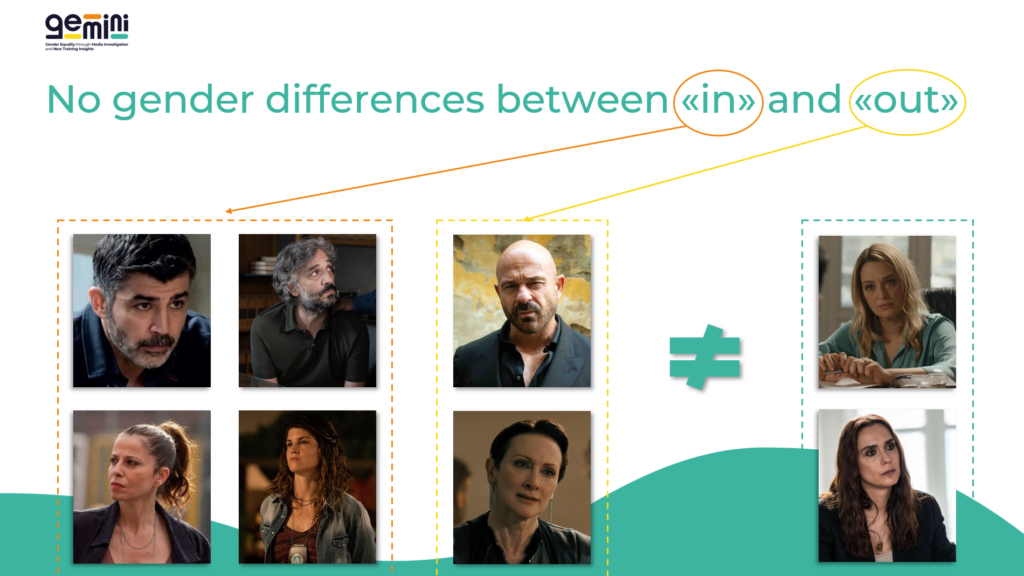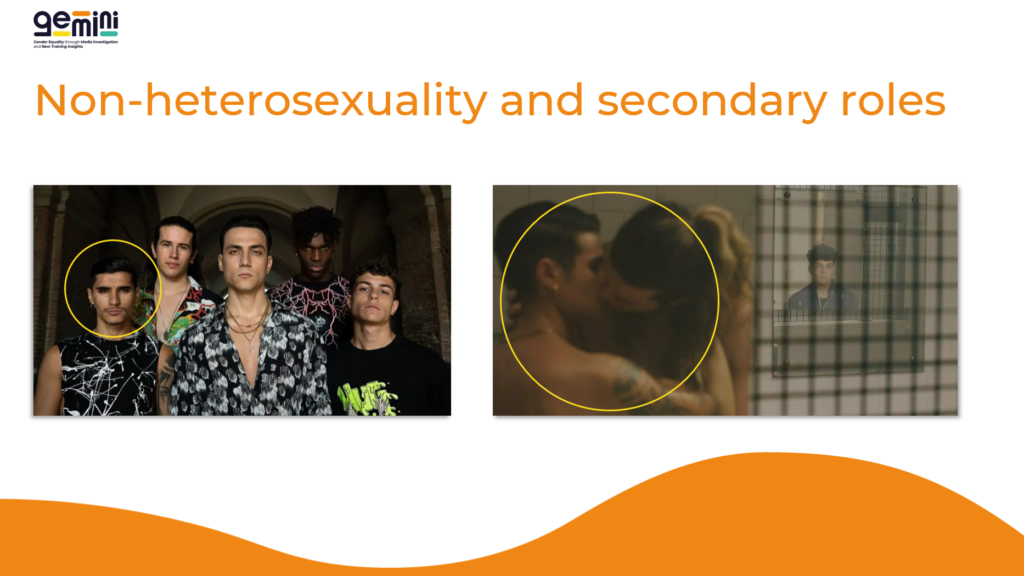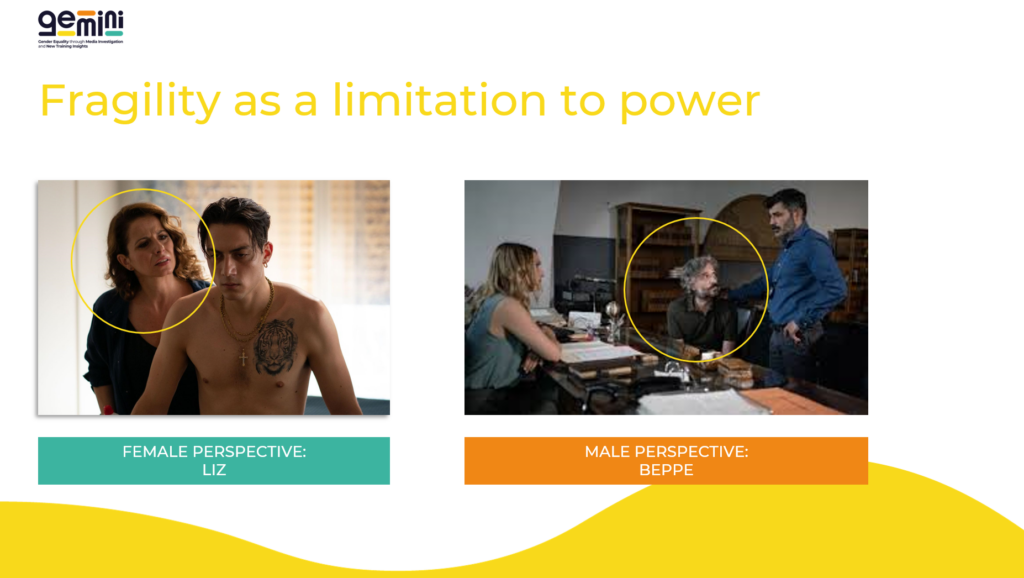Gender stereotypes and the idea of “power”
Reading the Italian teen drama Mare Fuori
By Marica Spalletta and Paola De Rosa, November 4 2024
One of the most recurrent gender stereotypes concerns the relationship with the idea of power, touching on its nature, features, and forms of exercise.
Gender stereotypes can limit people’s access to positions of power. For instance, stereotypes that portray women as less capable in leadership roles can hinder their career progression and limit their access to decision-making positions.
Gender stereotypes can also shape the perception of the legitimacy of power held by different individuals. For example, a man in a position of authority might be automatically seen as more competent and capable than a woman in the same role, even if their abilities are similar.
Finally, gender stereotypes can influence how people exercise power. Social expectations about “masculine” and “feminine” behaviors can affect how men and women act in positions of power, shaping the decisions they make and the methods they use to assert their authority.
Given gender stereotypes can profoundly influence the ways power is perceived and exercised within society, how do serial dramas address this “dangerous relationship”?
A very effective answer to this question comes from the Italian teen drama Mare fuori.
Produced by RaiFiction and Picomedia, and distributed in several European countries and Latin America, Mare fuori focuses on the experiences of the inmates and staff of an imaginary juvenile prison based in Naples.
Across its 4 released seasons, Mare fuori features narratives of power which appear strongly gendered (and equally stereotyped), exploring the different dimensions of access, legitimization and forms of exercise.
ACCESS TO POWER
Looking at the first dimension, Mare fuori does not highlight limitations to access to positions of power based on the gender identity of the characters, although within a markedly binary framework those in leadership roles are always either men or women.
Focusing specifically on the adult characters associated with roles of power, no differences emerge between the “inside” dimension and the “outside” one

Within the prison, the leadership roles are assigned alternately to male characters, and female ones. However, from a qualitative perspective significant differences emerge regarding the gender connotation in power roles.
On the one hand, power appears to be “normally” male, as the access to power for male characters follows a linear path, typically without notable episodes or circumstances.
On the other hand, women gain access to power much more frequently than men through personal or familiar trauma or particularly significant circumstances that have marked their personal and/or family lives, with important repercussions on the leadership role they exercise.
As an example, Sofia Durante, the director of the prison, turns out to have chosen this job for a very personal reason: in the past, Sofia had been a helpless witness to the death of her sister, caused by a group of thugs who had attacked her with the intention of raping her.
POWER LEGITIMIZATION
Moving from the access to power to its legitimation, Mare fuori tends to stress the correlation between the legitimization of power and sexual orientation.
A first narrative frame establishes the notion that power is heterosexual. This is illustrated through the recurring statements of the members of Ciro Ricci’s gang, within the prison, clearly indicating that all people of the Ricci clan are interested exclusively in women, and thus underscoring how homosexuality is perceived as a diminishment of power.
A second narrative frame highlights how a sexual orientation other than heterosexuality is typically associated with secondary characters or those who do not hold power. Milos, a member of Ciro’s gang, exemplifies this frame. Secretly homosexual, Milos’ role within the clan is merely executive, reflecting how non-heterosexual characters are relegated to subordinate positions.
A third narrative frame synthesizes the first two, demonstrating how a sexual orientation other than heterosexuality, particularly homosexuality, becomes problematic when aspiring to a role of power. This is perfectly exemplified by the character of Cucciolo, whose homosexuality proves to be an obstacle to his ambition of becoming a leader within the prison.

EXERCISE OF POWER
Finally, looking at how people exercise power in Mare fuori from a gender-stereotyped perspective, there are at least three particularly meaningful representations.
The first representation involves women wielding power through traits typically associated with authoritarian and sometimes brutal masculinity, both physically and psychologically.
This is the case of donna Wanda, a character portrayed as a very strong, fierce, and ambitious woman. She embodies masculine leadership qualities that she had to adopt within her own household, allowing her to be both respected and feared in the world of the Camorra. Her portrayal challenges traditional gender roles, illustrating the intersection of gender and power within a criminal context.
The second representation is that of fragile femininity, which becomes a limitation to the exercise of power, even when it is officially sanctioned. This is exemplified by the character of Liz, a prison guard who, despite her seemingly resolute character, displays an excessive, almost maternal attachment to some prisoners. This attachment undermines her ability to act in an ethical and impartial manner, revealing the vulnerabilities that can hinder effective leadership.
In contrast, the third representation concerns fragile masculinity, particularly embodied by the character of Beppe. His portrayal highlights the limitations to exercising recognized and respected authority within the prison. From this point of view, the character of Beppe struggles with insecurities and vulnerabilities that undermine his ability to assert control and command respect, presenting a stark contrast to the more traditionally masculine displays of power.

In conclusion, the representation of power dynamics in Mare fuori addresses a diverse array of gender-related issues. On one hand, this teen drama reinforces many of the gender stereotypes that exist in society. On the other hand, it offers intriguing insights into the nature of power within the specific context of a young offenders’ institution, where the dynamics between peers, as well as those between young inmates and the adult world, can serve, within certain limits, as a tool for challenging prejudices. A comprehensive exploration of the relationship between gender stereotypes and their portrayal in serial dramas will be featured in the forthcoming GEMINI educational toolkit. Stay tuned for more!


